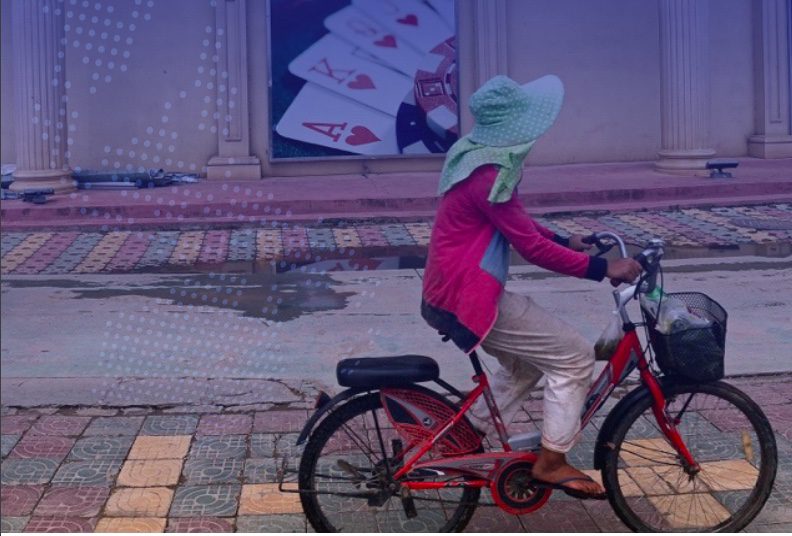
IOM’s Regional Situation Report on Trafficking in Persons into Forced Criminality in Online Scamming Centers in Southeast Asia
Trafficking in Persons into Forced Criminality in Online Scamming Centers in Southeast Asia
Testimonies from the Report: Nasim
Nasim*, a 20-year-old university graduate, fluent in both English and Chinese, found himself in a harrowing situation after the unfortunate wave of job losses hit Dubai, where he has been working for years. Nasim was seeking job opportunities without considering the potential risks.
Successfully securing a job in Mae Sot, he later met an agent who promised him a well-paying opportunity in Chiang Rai, Thailand. “During our journey, we crossed a river, and my concerns grew. Despite the reassurance from the agent, my fears materialized when, after a seemingly endless drive, the car abruptly stopped, and I was forced out of the car, and instructed to cross the river with a Chinese girl.”
Realizing that he had been trafficked into a scam compound, for two weeks, Nasim constantly faced threats and endured the stress of being hung by his hands until he succumbed to scamming others. “I spent a month in the compound, grappling with depression, hopelessness and isolation, forced to exploit individuals and scam them out of their life savings.”
Yearning to escape, one day, Nasim made up a story about a severe toothache, convincing the person in charge of the centre that he needed urgent surgery. “My supervisor then arranged for the driver to take me to a dentist. At the dentist’s office, I confided in them, seeking their help. After pretending to undergo an operation, I seized my chance and jumped out of the car. At that time, I had been in contact with a local NGO for about 10 days. After my escape, I ran into a family, from where I urgently contacted the staff of the local NGO, who swiftly came to my rescue.”
With the help from the NGO and IOM, Nasim was provided safe shelter, where his wounds and traumas were properly treated. Due to lacking a valid travel document, Nasim contacted the authorities, and following a legal process, was sentenced to six months of imprisonment before being eventually granted a pardon. “I returned to my country of origin with the support of IOM and was provided with reintegration support to restart my life.”
Testimonies from the Report: Sinta
By all accounts, conditions in the centres are brutal. Sinta*, was also promised a good job opportunity by a friend. Not being able to speak English, however, made reaching her targets a herculean task. “They kept reducing my salary when I could not reach my targets”, she says. “When I asked how I could go home, they said I had to pay back 200 million rupiah [approximately USD 13,400]. They even threatened to sell me to an organ harvesting syndicate.”
No longer able to tolerate the conditions, a group of Indonesians decided to ‘go on strike’, resulting in them being locked up in a room for two weeks. As luck would have it, one member of the group who had secretly kept a second phone, recorded a video of their situation and published it online. The video went viral in Indonesia, gaining the attention of authorities at the highest level. With so much publicity, the traffickers deemed the group too big of a risk to keep, eventually releasing them back into Thailand.
After receiving initial support from a local organization along the border, the group was referred to the Indonesian Embassy. At the embassy’s request, IOM provided the group of 26 with food, accommodation, legal counselling and interpretation support during their weeks-long stay in Bangkok, before returning home. “
Because this emerging trafficking trend is so complex, protecting victims effectively requires strong coordination. IOM works closely with the national and provincial authorities, civil society and embassies to provide assistance when needed,” explains Géraldine Ansart, IOM Thailand’s Chief of Mission.
“Moreover, one of our priorities is to enhance capacities to accurately identify trafficking cases,” Ansart adds. “IOM supported the government last year to establish the National Referral Mechanism (NRM) on Protection and Assistance of Victims of Trafficking – a new national policy framework that stipulates roles and responsibilities in victim screening, identification, assistance and referral – and sensitized over 2,300 frontline officials on the framework.”
Without rigorous screening measures, victims can fall through the cracks, decreasing the chances of better understanding of the situation and preventing others from being trafficked. Full story available at: https://thailand.iom.int/stories/forced-crimetrafficking-survivors-thailand-tell-their-stories
